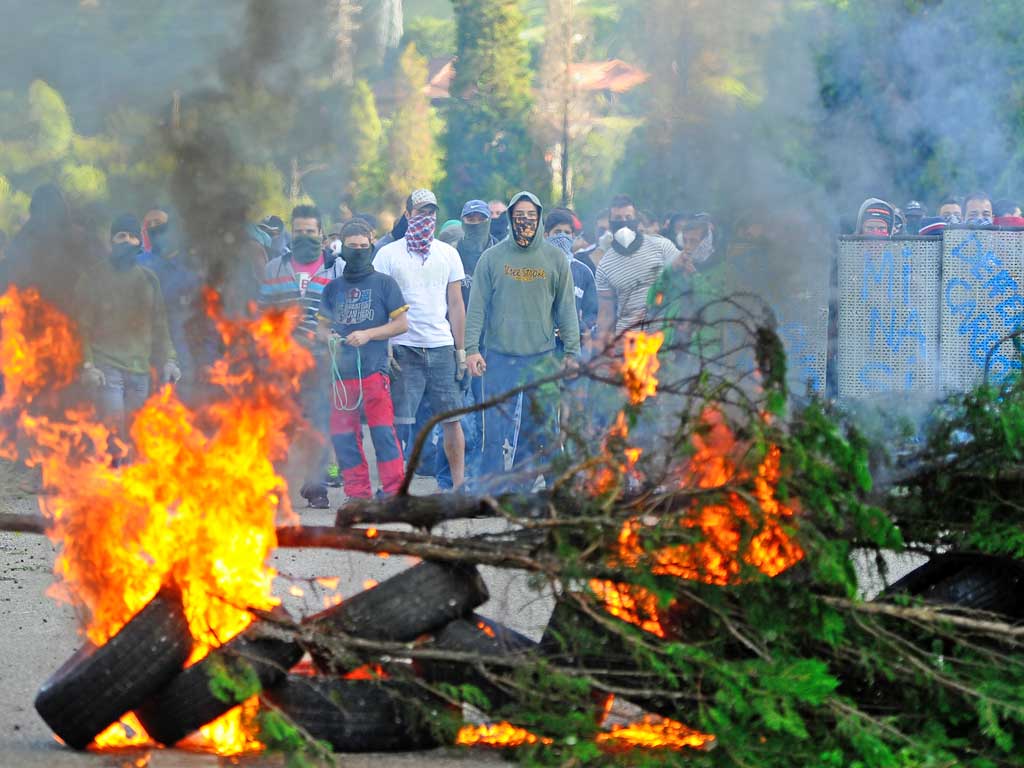Germany baulks at Spain's plan for for bailout of banks
Angela Merkel at odds with Mariano Rajoy as Madrid looks to secure lifeline for its lenders

Your support helps us to tell the story
From reproductive rights to climate change to Big Tech, The Independent is on the ground when the story is developing. Whether it's investigating the financials of Elon Musk's pro-Trump PAC or producing our latest documentary, 'The A Word', which shines a light on the American women fighting for reproductive rights, we know how important it is to parse out the facts from the messaging.
At such a critical moment in US history, we need reporters on the ground. Your donation allows us to keep sending journalists to speak to both sides of the story.
The Independent is trusted by Americans across the entire political spectrum. And unlike many other quality news outlets, we choose not to lock Americans out of our reporting and analysis with paywalls. We believe quality journalism should be available to everyone, paid for by those who can afford it.
Your support makes all the difference.The travails of the Spanish banking system have opened up a rift at the heart of Europe, with growing resistance in Berlin to Madrid's attempts to secure a lifeline for its beleaguered lenders.
The Spanish Prime Minister Mariano Rajoy is believed to be arguing for a direct rescue for the country's troubled banks without appealing for a national bailout. The latter would burden Spain with the kind of strict budgetary conditions that have provoked a popular backlash in Greece.
Spanish media yesterday reported that the country's Economy Minister Luis De Guindos was engaged in intense negotiations with his German counterpart, Wolfgang Schäuble, about the viability of a fast-track intervention system that would allow Spain to avoid a bailout.
The European Union's economic affairs commissioner Olli Rehn suggested that Brussels could use the European Stability Mechanism, the new permanent European rescue fund, for a direct recapitalisation of weak lenders. However, he acknowledged that such a move would call for an amendment to the treaty that governs the fund.
"This is not part of the ESM treaty for the moment, in its present form, but we see that it is important to consider this alternative of direct bank recapitalisation as we are now moving on in the discussion on the possible ways and means to create a banking union," he said.
But, in a sign of growing resistance in Berlin, a German government spokesman said: "It is only for a national government to decide whether it draws on the rescue mechanism."
The apparent difference of opinion was underscored by a report in Germany's Der Spiegel magazine yesterday that mounting German concern about eurozone instability had prompted Chancellor Angela Merkel and Mr Schäuble to pressurise the Spanish government into accepting emergency bailout funding.
At a meeting last Wednesday, Mr Schäuble was said to have pressurised Mr de Guindos to accept funding from the European Financial Stability Facility – the temporary bailout mechanism that will in due course be replaced by the ESM – to inject liquidity into Spain's ailing banks. Berlin's eurozone experts estimate that Spanish banks need between €50bn and €90bn in fresh capital in order to survive the current crisis. But Madrid has so far resisted applying for EFSF funding. The country's borrowing rates have spiralled as a consequence.
Last week, Madrid was forced to pay 6.7 per cent interest rates on 10-year bonds – a figure alarmingly close to the 7 per cent rate which forced Portugal and Ireland to accept EFSF bailout funding in 2010 and 2011 respectively.
Concern about Greece and Spain's deepening crisis continues to hit the euro which lost nearly 7 per cent of its value against the dollar in May. Germany's blue-chip stock index, the Dax, also plunged 7 per cent in May – its biggest fall for that month since the index was founded in 1988. In Germany some experts blamed Chancellor Merkel's insistence on strict austerity programmes for ailing eurozone countries.
Folker Hellmeyer, a financial expert with the Bremer Landesbank told Die Welt: "The risks of the Merkel doctrine are now becoming apparent."
Gloom about the euro crisis and its ramifications for Europe as a whole was added to by one of Germany's leading Europe enthusiasts, the former Green Party Foreign Minister Joschka Fischer. In an article for the Süddeutsche Zeitung, Mr Fischer accused the Merkel government of dousing Europe's "blazing" house with "petrol rather than water" and warned of the possibility of a global economic crisis of a dimension "unknown to the present generation".
He insisted that Germany should press for European fiscal union. "That means Germany will have to use its industrial power and wealth as a guarantee for the survival of the eurozone," he added.
Join our commenting forum
Join thought-provoking conversations, follow other Independent readers and see their replies
Comments